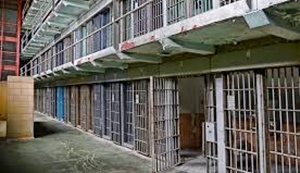Private prisons threaten to sue states over vacancies
10 Nov 2015
Does social development lead to less crime? It would appear so, going by recent reports from two of the most developed nations – in the Netherlands, the authorities are closing prisons because of a lack of criminals, while in the US, private prisons are actually threatening to sue their respective states because they have too many vacancies!

A closer look, though, shows that the issues involved are rather different, though crime rates have been going down in both countries.
The case of the Netherlands is fairly straightforward – there are simply too few criminals, so the Dutch justice ministry has announced it will close eight prisons.
But in the US, it is a case of capitalism gone haywire – while crime is coming down, privatised prisons have contracts with states about the minimum number of vacancies to be filled.
And the prisons are demanding that 'quotas' be met, or else the taxpayer must cough up for the empty beds!
Declining crime rates in the Netherlands – which has long decriminalised relatively venial offences like drug use and prostitution – means that although the country has the capacity for 14,000 prisoners, there are only 12,000 detainees.
The decrease is expected to continue, the justice ministry said, with deputy justice minister Nebahat Albayrak saying that natural redundancy and other measures should counter any forced lay-offs.
The Criminal Justice Alliance (CJA), which represents more than 60 Dutch organisations, has called for the government to urgently limit "the unnecessary use of prison, ensuring it is reserved for serious, persistent and violent offenders for whom no alternative sanction is appropriate".
It came after chief inspector of prisons Nick Hardwick said the rising pressure on prisons from budget cuts and increasing numbers cannot go on indefinitely.
System goes topsy-turvy
In the US, on the other hand, the prison-industrial complex is so out of control that private prisons are virtually ordering states to keep beds full or face stiff financial penalties.
Private prisons in some states have language in their contracts that state that if they fall below a certain percentage of capacity then the states must pay the private prisons – and the amount runs to millions of dollars, failing which they could face a lawsuit for millions more.
Advocacy group, 'In the Public Interest' has reviewed more than 60 contracts between private prison companies and state and local governments across the country, and found language mentioning ''quotas'' for prisoners in nearly two-thirds of those contracts reviewed.
Those quotas can range from a mandatory occupancy of, for example, 70 per cent in California to up to 100 per cent in some prisons in Arizona.
Even those who do not subscribe to conspiracy theories have looked askance at this report, which implies that cops must throw people – often from underprivileged backgrounds – into jail to avoid penalising taxpayers.
One of those private prisons, The Corrections Corporation of America, made an offer last year to the governors of 48 states to operate their prisons on 20-year contracts, according to In the Public Interest.
The offer included a demand that those prisons remain 90 per cent full for the duration of the operating agreement. So there is an unspoken push for police and the courts to send more to prison for petty, frivolous and nonviolent crimes.
There will also be a ''nudge'' for judges to hand down longer or maximum sentences to satisfy this ''quota.''
And when the crime rate drops so low that the occupancy requirements can't be met, taxpayers are left footing the bill for unused facilities.
The report found that 41 of 62 contracts reviewed contained occupancy requirements, with the highest occupancy rates found in Arizona, Oklahoma and Virginia.
In Colorado, Democratic Governor John Hinklooper agreed to close down five state-run prisons and instead send inmates to three corrections facilities. That cost taxpayers at least $2 million to maintain the unused facilities.
Critics seem justified in saying it is getting more difficult to rationalize the societal cost of keeping prisons full just to satisfy private investors who treat prisoners as a commodity.


















